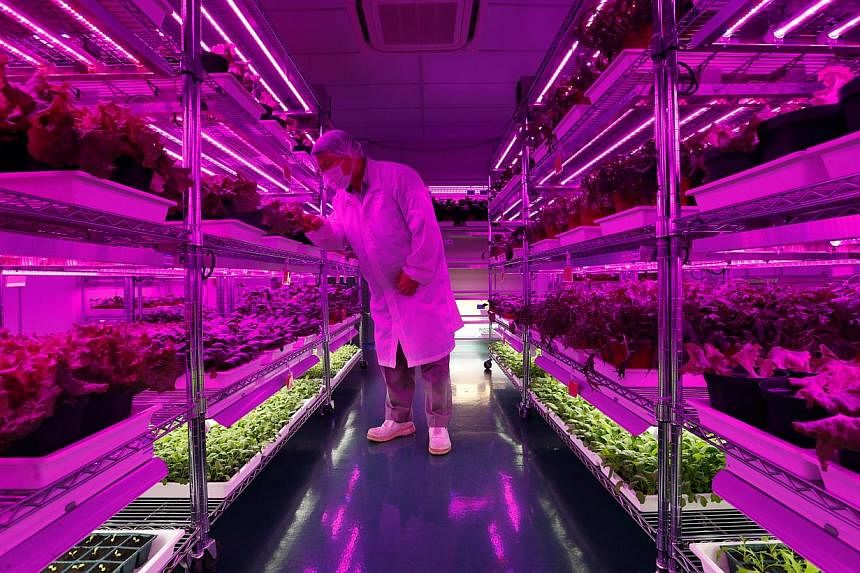Electronics giant Panasonic has set up an indoor farm here to supply local restaurants and retailers with vegetables such as lettuce and radishes.
The farm occupies 248 sq m of its factory building in Jalan Ahmad Ibrahim in Jurong - equivalent to two five-room HDB flats.
Its crops are grown without pesticides and are not genetically modified. They are housed within an enclosed space where conditions such as light, temperature and humidity are created artificially and controlled. It was set up last September and began supplying Japanese restaurant chain Ootoya with lettuce, potherb mustard and radishes in April.
Today three Ootoya restaurants will add four items made mainly with these ingredients to the menu. Ootoya pays Panasonic up to 50 per cent less than it would to a Japanese supplier to get about 300kg of vegetables.
Its senior executive director Hiroaki Hamada said they are more "crunchy and fresh", adding: "The biggest benefits would be stability of supply and quality. Getting produce locally also helps reduce the impact of food scares abroad."
By the first quarter of 2016, Panasonic aims to supply supermarkets here with local produce. Certain vegetable varieties such as mizuna and mitsuba may also be available at up to half the price of Japanese imports.
At Japanese supermarket Medi-ya, a packet of mizuna weighing about 100g costs $7.90.
Mr Hideki Baba, managing director of Panasonic Factory Solutions Asia Pacific, said: "We want to contribute to Singapore's self- sufficiency in leafy vegetables and can utilise our automation systems to do so. We foresee potential growth in agribusiness for our portfolio here."
Mr Baba added that agribusiness is likely to make up a big part of company revenue here by 2017.
In Japan, the potential revenue has reportedly also drawn other electronics firms such as Fujitsu and Sharp into agribusiness.
According to the Agri-Food and Veterinary Authority (AVA), 8 per cent of leafy vegetables eaten here are grown locally. Some 10,308 tonnes were produced by farms here last year.
Panasonic's farm - the only indoor soil-based vegetable farm licensed here - has a production capacity of 3.6 tonnes per year but this will rise to 1,000 per year by 2017 through methods such as vertical farming and reducing the cultivation time of crops. It will also expand its variety of vegetables from 10 to more than 30.
Another high-tech farm here, Sky Greens, also hopes to supply vegetables like spinach to supermarkets by the end of this year.
Local produce has got the thumbs up from consumers. Pastry sales executive Lee Si Han, 28, said: "It will help reduce carbon footprint... Imported vegetables suffer a lot on their way here - they get bruised. Local ones will be fresher."


